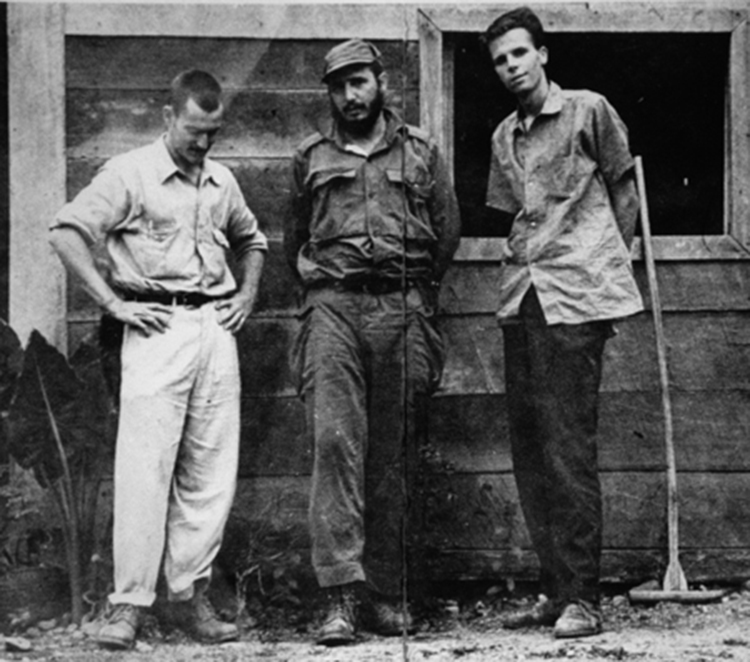Book Review: Wild Green Oranges, by Bob Baldock.
(Clapton Press, London, 2021, 238 pages)
By Roger D. Harris
Wild Green Oranges describes how author Bob Baldock dropped out of college and was at loose ends in 1958. Then he became inspired after a chance viewing of a newsreel. It was about a band of rebels in the remote eastern mountains of Cuba fighting a guerilla war against the US-backed Batista dictatorship. He had access to news about the little-known events in Cuba at his job as a copyboy at the (now defunct) New York Herald Tribune and became determined to interview the rebels.
Then a youth of nineteen years, his only travel outside the Midwest was to New York City. He recruited another dropout classmate, forged press credentials, and hitched to Miami. Working odd jobs and getting by with a little help from their friends to buy air tickets, the two flew to Havana.
Dodging Batista’s security, the buddies traveled across the island toward the rebel enclave. His descriptions of the deprivation in Cuba under the dictatorship are graphic.
By luck and aid from the clandestine movement, they made their way into the Sierra Maestra. There they somehow hooked up with Fidel Castro and his 26 de Julio movement. At first the rebels couldn’t believe that the youths had survived the journey and found their hideout.
But what to do with these two periodistas (journalists), who had never written an article? Celia Sánchez, Castro’s closest revolutionary compañera, made clear that the two North Americans had best make themselves useful. The meager food they were eating was at the expense of the small group of 30 to 60 revolutionary combatants.
So Baldock put his two years of college to good use. He had been in the Reserve Officers’ Training Corps (ROTC) and knew how to handle an M1 rifle. For five months, he fought with the revolutionary forces. The book presents an intimate window into the revolutionary struggle, complete with photographs.
Only after getting seriously wounded and contracting a life-threatening case of bacillary dysentery was Baldock forced to leave.
Wild Green Oranges, as an adventure story, is a page-turner. But, because it is autobiographical, it is not really a spoiler to reveal that Baldock lived to tell the tale. Baldock went on to a career of working for progressives causes and organizations such as Black Oak Books and Pacifica Radio.
The book’s self-description as “an autobiographical novel” is a bit misleading. All the events actually took place, according to the author, including his close relationships with leaders of the Cuban Revolution such as Castro and even meeting the legendary Che. However, Baldock includes dialogue for dramatic effect, which had to be recreated to the best of his memory.
The book had to be published out of the country because of the difficulty of getting US publishers to include a title favorable to the Cuban Revolution. However, it can be purchased at a reasonable price from most US book outlets.
Only a few months after Baldock left the Sierras, the Cuban Revolution triumphed on January 1, 1959. For the same reason that Cuba has earned the admiration of oppressed peoples and allies worldwide, it has engendered the eternal hatred of the colossus to the north. Cuba is now into sixty years of a crippling US blockade.
The current US president, contrary to his campaign pledges, has intensified the US hybrid war against Cuba. Joe Biden continues the same illegal policy of regime change against Cuba as that of the previous twelve US presidents: covert and overt destabilization, blockade, and occupation of Guantánamo.
Despite an economy that’s been ravaged by the pandemic and the tightening of the US blockade, Cuba has produced three COVID vaccines with two more in development. More than 90% percent of Cubans are vaccinated, surpassing the US.
World pandemic, increasing inequities, environmental catastrophe, and the possibility of an annihilating nuclear conflagration is the trajectory of the dystopian future promised by US “world leadership.” Cuba and the other peoples and nations striving for socialism are our glimpse into a better world. Although he never returned to Cuba, now 85-year-old Baldock is still proud to say for good reason, “I remain a Fidelista!”
Roger D. Harris is with the 37-year-old human rights organization Task Force on the Americas.










